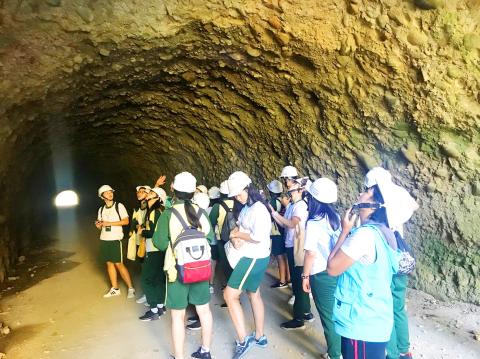Three tunnels along an abandoned road on Shibaluohanshan (Eighteen Arhats Mountain, 十八羅漢山) in Kaohsiung that was once a key route for the camphor oil trade are now popular tourist attractions, and are expected to draw a lot of visitors over the Lunar New Year holiday.
One of the Liouguei Tunnels (六龜隧道) in Liouguei District (六龜) is inhabited by hundreds of Taiwanese leaf-nosed bats, while another is home to a large number of Pacific swallows, all of whom took up residence in the tunnels after 1992, when the road through them that was built in 1936 was replaced by one that bypasses the mountain.
Liouguei District is between the Pingtung Plain and the Central Mountain Range, and its forests, at 800m above sea level, were perfect for camphor trees, said local tour guide Chang Yun-cheng (張運正), whose family has lived in the area for several generations.

Photo: CNA
During the Japanese colonial era from 1895 to 1945, Liouguei was known for its output of camphor oil, which was a key ingredient in insect repellents as well as smokeless powder used in the production of bullets and artillery shells, Chang said.
The lucrativeness of the camphor trade led the Japanese colonial government to construct a route through Shibaluohanshan in the 1930s to facilitate the transport of camphor and logs.
The Japanese drilled six tunnels with a total length of 792m along the route, Chang said.
However, the importance of the tunnels as an economic and strategic lifeline gradually faded after Japan withdrew from Taiwan in 1945.
However, the increase in traffic in the 1980s, with a heavy volume of vehicles carrying visitors to Shibaluohanshan and other forested sites in Liouguei and neighboring Meinong District (美濃) led to the construction of Taiwan Provincial Highway 27A, which opened in 1992. At the same time, Shibaluohanshan was designated as part of a nature reserve, which left the tunnels to wildlife.
The Forestry Bureau reopened three of the tunnels to visitors in September last year, and hired guides to provide tours of their ecological and cultural features.

A preclearance service to facilitate entry for people traveling to select airports in Japan would be available from Thursday next week to Feb. 25 at Taiwan Taoyuan International Airport, Taoyuan International Airport Corp (TIAC) said on Tuesday. The service was first made available to Taiwanese travelers throughout the winter vacation of 2024 and during the Lunar New Year holiday. In addition to flights to the Japanese cities of Hakodate, Asahikawa, Akita, Sendai, Niigata, Okayama, Takamatsu, Kumamoto and Kagoshima, the service would be available to travelers to Kobe and Oita. The service can be accessed by passengers of 15 flight routes operated by

MORE FALL: An investigation into one of Xi’s key cronies, part of a broader ‘anti-corruption’ drive, indicates that he might have a deep distrust in the military, an expert said China’s latest military purge underscores systemic risks in its shift from collective leadership to sole rule under Chinese President Xi Jinping (習近平), and could disrupt its chain of command and military capabilities, a national security official said yesterday. If decisionmaking within the Chinese Communist Party has become “irrational” under one-man rule, the Taiwan Strait and the regional situation must be approached with extreme caution, given unforeseen risks, they added. The anonymous official made the remarks as China’s Central Military Commission Vice Chairman Zhang Youxia (張又俠) and Joint Staff Department Chief of Staff Liu Zhenli (劉振立) were reportedly being investigated for suspected “serious

ENHANCING EFFICIENCY: The apron can accommodate 16 airplanes overnight at Taoyuan airport while work on the third runway continues, the transport minister said A new temporary overnight parking apron at Taiwan Taoyuan International Airport is to start operating on Friday next week to boost operational efficiency while the third runway is being constructed, the Ministry of Transportation and Communications said yesterday. The apron — one of the crucial projects in the construction of the third runway — can accommodate 16 aircraft overnight at the nation’s largest international airport, Minister of Transportation and Communications Chen Shih-kai (陳世凱) told reporters while inspecting the new facility yesterday morning. Aside from providing the airport operator with greater flexibility in aircraft parking during the third runway construction,

Taiwanese and US defense groups are collaborating to introduce deployable, semi-autonomous manufacturing systems for drones and components in a boost to the nation’s supply chain resilience. Taiwan’s G-Tech Optroelectronics Corp subsidiary GTOC and the US’ Aerkomm Inc on Friday announced an agreement with fellow US-based Firestorm Lab to adopt the latter’s xCell, a technology featuring 3D printers fitted in 6.1m container units. The systems enable aerial platforms and parts to be produced in high volumes from dispersed nodes capable of rapid redeployment, to minimize the risk of enemy strikes and to meet field requirements, they said. Firestorm chief technology officer Ian Muceus said